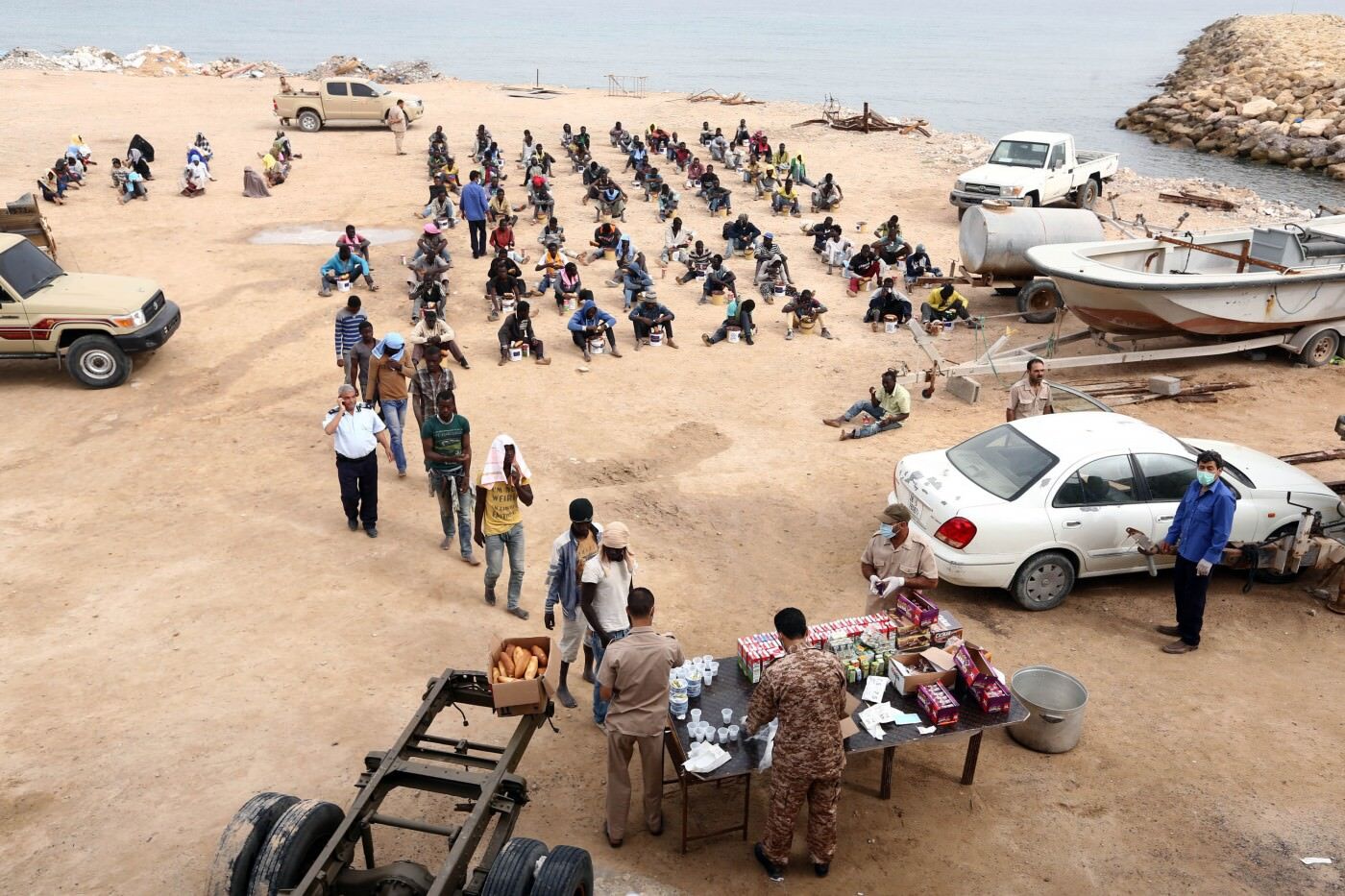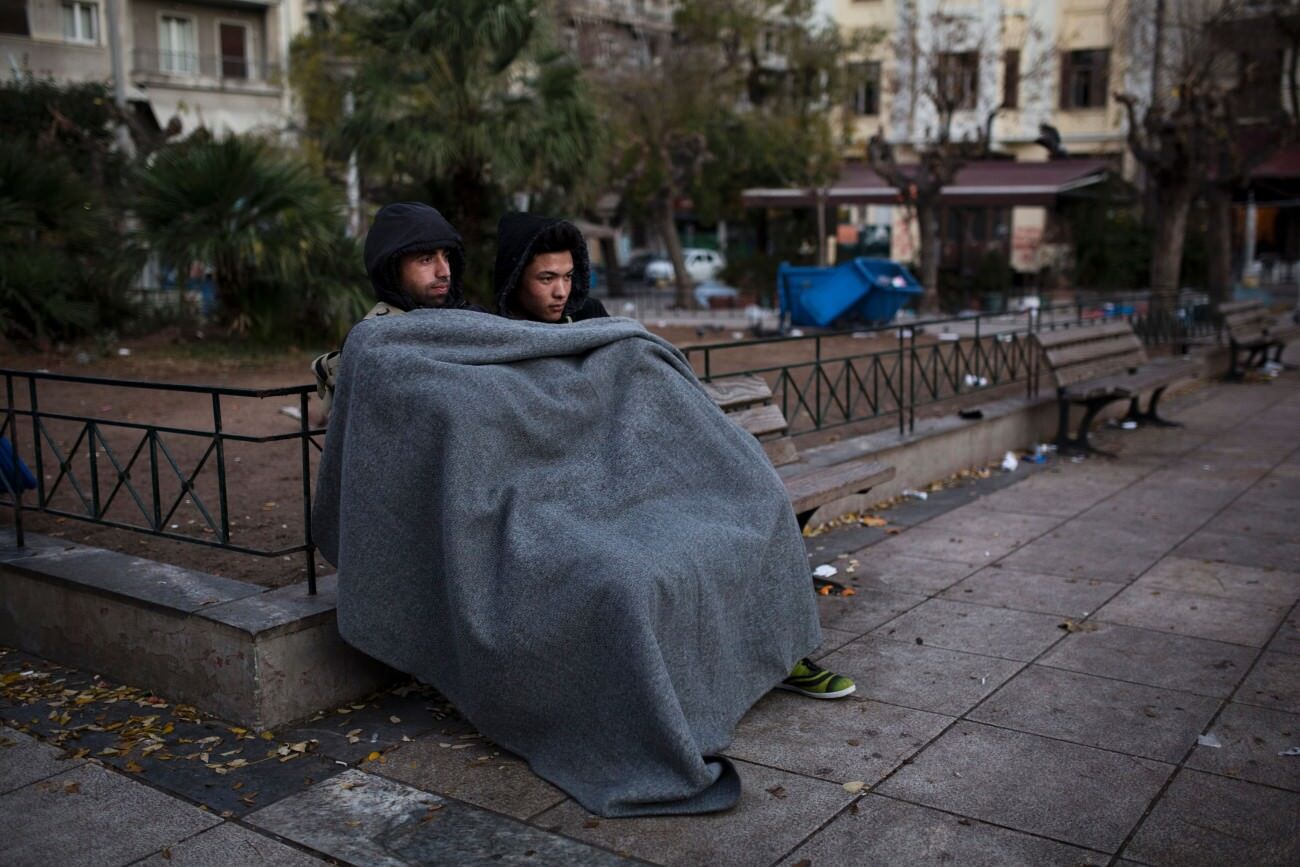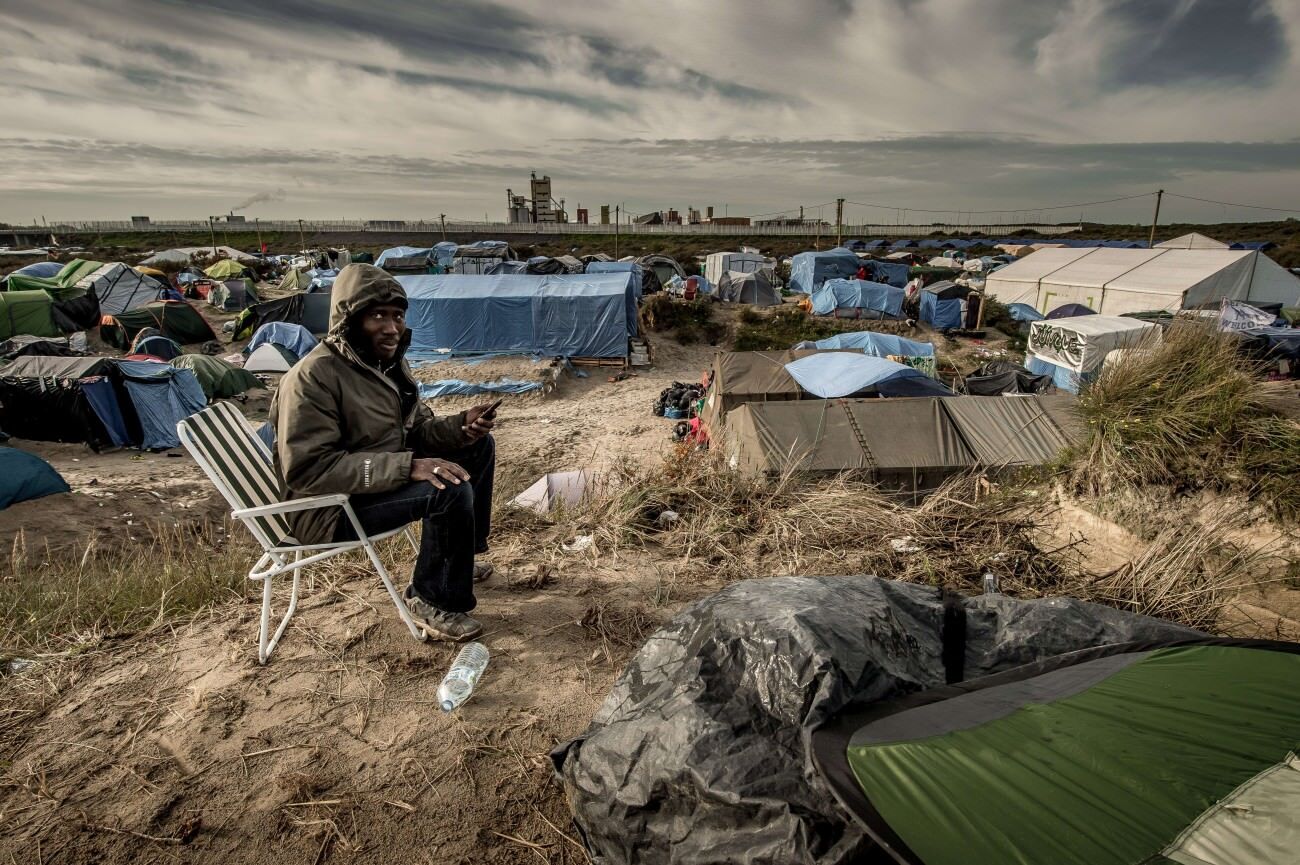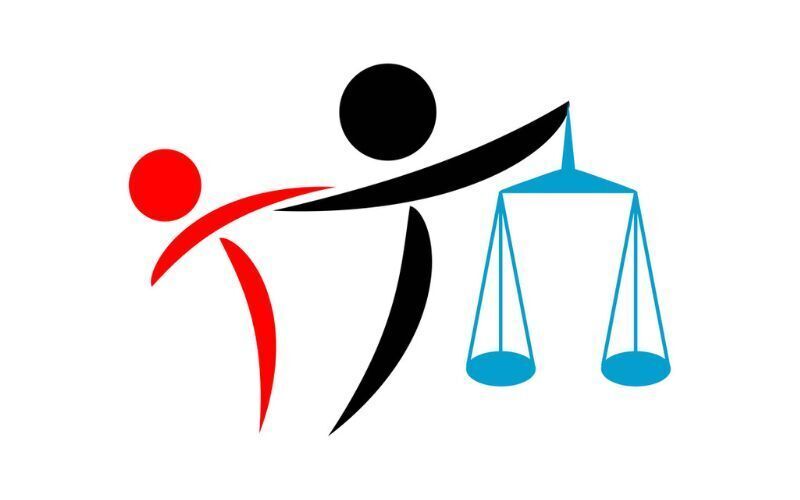Refugees Don’t Need Your Pity

In a world where 1 in 7 people are displaced, your kindness is just condescension.
by Anna Badkhen
The pirogues are long and narrow, precision-chiseled with an ax from planks of obeche and mahogany. They are waterproofed with an emulsion of baobab-leaf powder, cement, sawdust, and tar and are painted pink, yellow, violet, green, red. Pointing out to sea, they berth right on the beach that molds the western border of Joal — a 4-mile-long dune spit at the southern tip of Senegal’s Petite Côte. The boats crowd the shore so thickly that in spots you must turn sideways to squeeze between them.
Most of the fishermen who sail the pirogues are not from Joal. Take, for example, the crew of the 69-foot-long Mansor Sakho (she is painted sky blue). There is Ibrahima from Gambia. Fili from Dakar. Issa the Fulani, from Senegal’s brushy hinterlands. Moustapha, most recently from Spain, where in five years he could not land a steady job. A handful of boys from up and down Senegal’s coast. The captain, Mamour Ndiaye, who always goes to sea wearing the same tank top in the pattern of the American flag, came here as a teenager from a port 20 miles to the north.
Each boat is a monument to human tenacity — or desperation. So is Joal. Fifty years ago, it was a village of 6,546 millet farmers and five pirogues. Then a terrible drought wrung the Sahel; crops shriveled and skeletal people scooped their dead into roadside mass graves. In Senegal’s starved bush, farmers loaded onto donkey carts and caravanned seaward. Entire villages relocated and took up seining the Atlantic Ocean. By 2013, migrants swelled Joal’s population to 45,903 people. There are now 2,000 boats.
All migrations are forced; as a species, humans prefer to stay put. In Africa, people have been on the move since the dawn of time, walking away from hunger, epidemics, wars, misfortune. The most enterprising — or the most wretched — hiked out of the mother continent between 100,000 and 60,000 years ago. Their descendants kept walking, all the way to Patagonia, the first economic migrants hoofing it for the New World.
But today’s era is one of unprecedented migrations, scored into the Earth’s geography by an iniquitous balance of power: The Global North, with its avarice for resources abroad, its comparative luxury in a world of unmet need, and its fanatical xenophobia, directly or indirectly dictates all of today’s mass movement, determines and deters its routes. Meanwhile, the dislocation itself, in Africa and elsewhere, originates almost entirely between the tropics of Cancer and Capricorn. Call it, if you will, the Belt of the Dispossessed.
Migrants who’ve been detained receive food in Tajura, a coastal suburb of the Libyan capital Tripoli on Oct. 10, 2015, ahead of being transferred to a detention facility. Almost 300 migrants, a third of them from Senegal, were arrested as they prepared to board boats for Europe, according to Libyan authorities. (Mahmud Turkia | AFP/Getty Images)
This inequity is why men from across West Africa have come to Joal. They are here to put seafood on foreign plates. World fish consumption has almost doubled since the 1960s, to an average of more than 42 pounds per person in 2012, and it continues to rise. The United States and Europe receive most of their seafood from the Global South. Almost half the seafood caught off Senegal’s coast will be served at tables abroad.
So it is that a rapid reordering caused by the abuse of and violent competition for resources is turning farmers into fishers, effacing countrysides, uprooting towns, shattering entire countries. A billion souls are on the move. The magnitude of such an exodus is hard to fathom; to believe that it can be somehow forcibly arrested is myopic. Yet the sedentary world regards the homeless with intense suspicion: Have they done something wrong? (God punished Cain by rendering him vagrant.) The Global North is building fences, deporting children, stymieing the progress to safety of war refugees from Syria, South Sudan, Iraq, and Afghanistan. Europe is paying Turkey to play bouncer and keep asylum-seekers outside its borders. The settled West is telling migrants: We pity you, but we don’t trust you, and we want to keep pitying you on your shores rather than welcoming you to ours.
Rootlessness — the implied weakness of it — is treated as a failure. That is plainly schizophrenic: In a world where one in seven people is displaced, the failure must be of planetary scale. It belongs to all of us. This is a century of dislocation not merely of body and home, but also of empathy, dignity, compassion.
How did we get here? Polish journalist Ryszard Kapuscinski, who worked in Africa for decades, once told an audience in Krakow: “I the Self can exist as a defined being only in relation to — in relation to the Other, when he appears on the horizon of my existence, giving me meaning and establishing my role.” Once upon a time, bigotry may have been a matter of survival. Humans probably needed it to counterbalance their impulse for empathy, to limit compassion to extended family, immediate kin, themselves.
Bigotry is a primal need. It is also a prime origin of human wickedness. It made possible one of the world’s most immoral migrations, started on West African shores, within a day’s sail of Joal, by 15th-century Portuguese slave-traders. Since then, the human capacity for evil has evolved, taken more insidious shapes. From this geographical vantage point, the West’s rejection of migrants trying to reach it by boat from Africa looks like a macabre distortion: This time around, people are not shackled to be trafficked across the seas but are forcibly fenced out.
Bigotry finds its ultimate outlet in borders: artificial lines that carve and recarve continents, that are continuously adjusted to accommodate shifting alliances and fear, revised to turn countries into bunker states. Yet today’s migrants persistently test the resilience of these boundaries. By pushing the borders that hinder passage to imagined welfare at the risk of being turned away again and again at the gate, of becoming pariahs, or even of dying en route, migrants are throwing a challenge to bigotry itself.
Among them are the men who have arrived in Joal to try their hand at sea. The town is not a megasprawl, the kind of anonymous pandemonium that is becoming the face of migration in the Global South. Unless there is a wedding or a soccer game, it is quiet. It still has only one properly paved street—the only one with a name, Boulevard Jean Baptiste Collin, after Joal’s first post-independence mayor. (Collin was a migrant: He was born in France, Senegal’s former colonial master.) Joal’s life revolves entirely around fishing.

On Dec. 27, 2015, Afghan refugees sit on a bench in Victoria Square in central Athens, a spot where migrants and refugees have been staying. (Angelos Tzorrzinis | AFP/Getty Images)
But that won’t last. West Africa’s fishery is one of the most heavily exploited in the world. Thousands of traditional pirogues and dozens of foreign, mechanized boats — many operating without licenses and with impunity — sift Senegal’s waters to indulge global gluttony. Climate change exacerbates the devastation of ecosystems. The catch in Joal is down 75 percent from a decade ago.
Another migration looms, this time out of Joal. Some fishermen see the West as their next port of call. On the way back to harbor after another fruitless day at sea, the crewmen of the Mansor Sakho mull over what they will do when there are no more fish to catch — where they will go next.
“To Switzerland. My uncle lives there,” says Fili. “Back to Spain,” says Moustapha. “To Spain,” Ibrahima agrees.
Already, some fishers are operating as shadowy intermediaries between the world’s north and south. They have sailed to Guinea and Gambia and have turned the boats that once caught octopus and shrimp for the West into smuggling vessels to take emigrants to Europe. Everyone in Joal’s harbor seems to know such fishermen.
It is absurd to pretend that the West can distance itself from the enormous change its privilege creates and from the immense volume of souls it most immediately affects. The migrants in the footage from Mediterranean shores — they may have once sailed in pirogues or piloted them — are closer than they may seem. Collective hope transforms borders from buffer zones into permeable membranes. Demographics experts predict, for example, that within 20 years the United States will become a majority-minority country, largely because of migration from the Global South.
“We live in a global society where an Indian makes a living in Dakar, someone from Dakar makes a living in New York, and a Gabonese makes a living in Paris,” Senegalese-born writer Fatou Diome, who lives in Strasbourg, told a French television talk show last April in response to Europe’s callous reaction to the deaths of migrants in the Mediterranean Sea. “Whether you like it or not, this process is irreversible.”
Here is something else that sets apart migration in these hyperinformed times: It is numbingly accessible. Cell phones and the Internet may tell a prospective migrant what to expect from her journey. Social networks and a 24-hour news cycle tell us where such journeys take place. We can friend migrants on Facebook. We can watch on Instagram feeds as dead children float facedown in the Mediterranean surf.
“Everything is held together with stories,” the writer Barry Lopez once said. “That is all that is holding us together, stories and compassion.” But for all of our new accessibility, we know each other’s stories no better than before. The dominant narrative of the world’s dispossessed, broadcast by most media and in the halls of power, is imposed, uniform, reductive. It is defined by poverty levels set by the World Bank, by U.N. development benchmarks, by Western expectations for health care and education, and too often by the assumption that being on the move signals some personal deficiency. Instead of unfurling for us the lives of others, the story of the dispossessed — the very label itself — shuts them behind pity.
Pity is condescension; it reeks of neocolonial paternalism. It denigrates, leaves no room for sympathy. It does not allow you to see that Ibrahima from Gambia has an endearing stutter. That Fili from Dakar is 19 years old, that he is training to be Senegal’s next wrestling champion, that his favorite breakfast is a po’boy with spaghetti, beans, murex, onions, and french fries. That Issa the Fulani misses his wife who is pregnant with their first child, or that he misses his cows.

A man calls his family in Sudan on Nov. 5, 2015, from a camp in Calais. (Philippe Huguen | AFP/Getty Images)
Dispossessed is an identity of disempowerment, but it is a powerful identity. Borders may temporarily hold back the flow of humans adrift, but in a world where we are so tightly and dizzyingly interwoven, physical boundaries are far less obstructive than the lasting confinement of imposed narratives. Such is the double-edged power of stories: They can hold us together — and they can distort, isolate, and divide. The dispossessed: The tag’s impediment persists even after the bearer has crossed a border or town limits, settled in, become a neighborhood cop, a high school teacher, a daughter’s girlfriend, or a boat captain living next door. Unless the world finds compassion for this new communality, learns to make sense of one another’s voices, its humanity will perish.
I am a migrant. I grew up in the developing world, though my portion of the Global South lay in the deep north, at the 60th parallel, in Leningrad, USSR. I moved to the United States from Russia when I was 28. I was looking for a better life for me and my children; this makes me an economic migrant.
Who, me? I often forget. I don’t fit the stereotype. But the typecasting is so contagious that it has infected me, too, dislocated my sense of reality.
By Western standards — by the standards of the part of the world that lays the conditions for their migrations, their aspirations, and their woes — the fishermen of the Mansor Sakho epitomize the dispossessed. Most of the crew members live in Captain Ndiaye’s cinderblock shack, which, like his boat, is painted blue and stands on the beach. Twenty-two people crowd into six rooms. Feeding them all on less than $10 a day can be tricky. Then again, with everyone under the same roof, no one is ever late for work.
One evening, I stop by the Ndiayes’ blue house for a quick hello. The captain and his beautiful wife are sitting side by side in molded plastic chairs, facing the ocean. She is holding their youngest daughter at her breast. He is fanning himself with the tail of a long boubou. A small tin pot of strong sweet tea — a poor man’s dessert — is boiling on a coal brazier in front of them.
As is the custom in Senegal, they do not rise when they see me. Rather, they smile, extend their hands in greeting. They do not look dispossessed. They look regal.
Anna Badkhen is the author of five nonfiction books, including, most recently, Walking With Abel. Currently based in Senegal, she is at work on her next book, Fisherman’s Blues. A version of this article originally appeared in the January/February 2016 issue of FP under the title “The New (Re)Order.”
See article from source:

